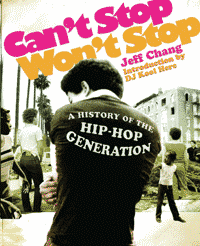
Ever since hip-hop hit the mainstream in the mid-’80s, a steady succession of books has picked apart the music and its meaning. But we’ve yet to see a comprehensive narrative of hip-hop stretching from point A to point Z. Music writer Jeff Chang’s Can’t Stop Won’t Stop is about as close as it gets.
Can’t Stop is both a chronicle of hip-hop’s evolution and an attempt to put the music in a historical context. For Chang, that context is the racial divide and the economic exploitation that he sees as the source of hip- hop’s anger and pathos. Tracing the music’s roots back to the late-’70s Bronx, he writes, “An enormous amount of creative energy was now ready to be released from the bottom of American society.” In his account of the next three decades, Chang makes little distinction between art and activism. Police brutality, media consolidation, and the aesthetics of DJing and graffiti are all part of a dense, swirling discourse on hip-hop history.
Chang uncovers plenty of interesting moments, including the face-off between Ice Cube and Angela Davis over the role of women in black liberation. But his hip-hop- as-manifesto formula can be limiting. While it’s easy to see what Rodney King meant to Cube, or what Yusuf Hawkins meant to Chuck D, Chang can’t quite get a grip on less overtly political performers like EPMD or Sir Mix-a-Lot. Can’t Stop isn’t the final word on where the music is going, but it’s truly an important addition to the hip-hop canon.















